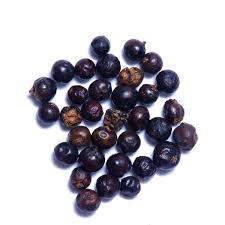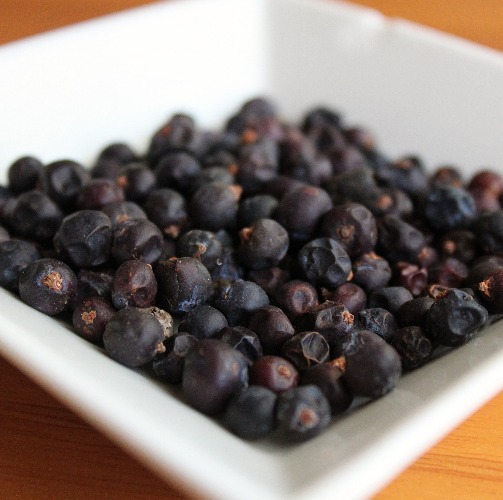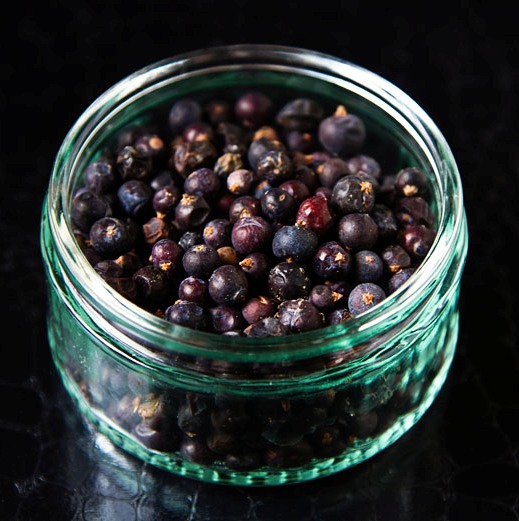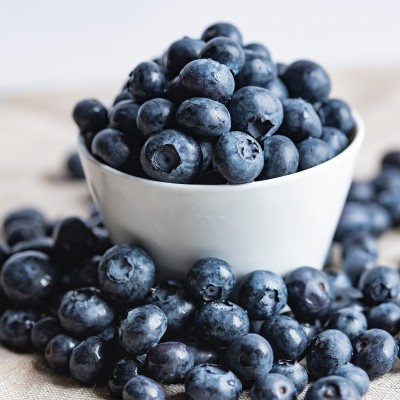-Essential-Oil.png)
-Essential-Oil.png)




Botanical name Juniperus communis L. cupressaceae
Family Cupressaceae
Source Berries
Origin Hungary
Processing Method Steam Distillation
Color/Consistency A thin, colorless to pale yellow liquid.
Aromatic Summary / Note / Strength of Aroma A middle note with a medium aroma, Juniper Berry has a fresh, rich, balsamic scent reminiscent of pine needles.
Blends With Eucalyptus, Chamomile, Rosemary, Marjoram, Geranium, Bergamot, Sandalwood and Clary sage.
Product Abstract
Juniper (Juniperus communis) is a coniferous evergreen shrub that belongs to the pine family (Cupressaceae) and is commonly found on heaths and mountains in North America, Europe and Southwest Asia. In the United States, junipers grow abundantly in the mountainous regions of the Appalachians, as well as in western states such as Arizona, California, New Mexico and Utah.The juniper tree can be identified by its stiff and needle-like blue-green leaves, short reddish-brown trunks, small yellow flowers and blue or black fruits or berries (produced by the female trees). The tree can grow anywhere between six to 25 feet high.The leaves, which grow in whorls of three on the woody twigs, emit a lemon- or apple-like fragrance when crushed.
History
Juniper berries, including Juniperus phoenicea and junipers oxycedrus have been found in ancient Egyptian tombs at multiple sites. J. oxycedrus is not known to grow in Egypt, and neither is juniperus excelsa, which was found along with J. oxycedrus in the tomb of tutankhamun.The berries imported into Egypt may have come from Greece; the Greeks record using juniper berries as a medicine long before mentioning their use in food
Harvesting/Extraction Information
The berries are green when young, and mature to a purple-black color over about 18 months. The berries are plucked from the branches of the plant once a year, and dried and ground before distillation. They have traditionally been used as an aromatic aid to meditation, and had remedial applications.
Common Usage
Caution
It should be avoided during pregnancy and by those who have kidney problems, and it should always be used in low concentrations.
Key constituents
a-Pinene 41.1%
b-Myrcene 15.2%
Sabinene 9.8%
Germacrene D 6.3%
(þ)-Limonene 3.1%
b-Pinene 2.8%
d-Cadinene 2.7%
Terpinen-4-ol 1.9%
Germacrene B 1.8%
b-Caryophyllene 1.7%
a-Caryophyllene 1.4%
b-Elemene 1.0%
Quality Common adulterants of juniperberry oil include the oil from fermented fruits, juniper wood and twig oil, turpentine oil and terpene hydrocarbon fractions. In one comparative analysis, 15 minor constituents, present in a lab-distilled oil at between 0.1 and 1.0%, were not detected in a commercial oil.
Safety summary
Hazards Skin sensitization if oxidized.
Cautions Old or oxidized oils should be avoided. Our safety advice Because of its high a-pinene content we recommend that oxidation of juniperberry oil is avoided by storage in a dark, airtight container in a refrigerator. The addition of an antioxidant to preparations containing it is recommended.
Regulatory guidelines
Has GRAS status. A warning about kidney irritation appears in the Expanded Commission E Monographs: ‘excessive use of juniperberry oil] may cause kidney irritation and damage because terpinen-4-ol has demonstrated irritant activities’
Organ-specific effects
Adverse skin reactions When tested at 8% on 25 volunteers it was neither irritating nor sensitizing. It is non-phototoxic. In a study of 200 consecutive dermatitis patients, one was sensitive to 2% juniperberry oil on patch testing. Since autoxidation products of a-pinene can cause skin sensitization, oxidation of a-pinene and other monoterpenes in the oil may be responsible for the skin reactions reported above.
Nephrotoxicity Two different batches of juniperberry oil were tested for 28 days in male rats with 100, 333 or 1,000 mg/kg, and 100, 300 or 900 mg/kg orally. Additionally, terpinen-4-ol was tested at 400 mg/kg. In spite of the high doses used, none of the tested substances induced changes in kidney function or morphology. Juniperberry oil has demonstrated renoprotective activity, completely reversing the decrease in inulin clearance caused by tacrolimus in rats.
Reproductive toxicity Most of the above referenced sources refer to ‘juniper’ generically, without specifying a preparation. None of theses refer to the probable scientific basis for the abortifacient activity of juniper. Ethanolic and acetone extracts of juniper berries have a significant antifertility effect in rats. An ethanolic extract of juniper berries demonstrated both an early and a late abortifacient activity in rats. An ethanolic extract would contain some essential oil, but there is no evidence that the essential oil is responsible for these effects. Since the oil constitutes only 1.5% of the raw material, and since all the major constituents of the essential oil are apparently non-toxic.
Systemic effects
Acute toxicity Juniperberry oil acute oral LD50 in rats reported as 8.0 g/kg and as >5 g/kg; acute dermal LD50 in rabbits >5 g/kg.
Antioxidant/pro-oxidant activity Juniperberry oil showed moderate antioxidant activity as a DPPH radical scavenger and in the aldehyde/carboxylic acid assay.
Carcinogenic/anticarcinogenic potential No information found. (þ)-Limonene displays anticarcinogenic activity.
Comments
There are two likely reasons why juniperberry oil acquired a ‘tainted’ reputation, which has since been quoted and re-quoted. Firstly, there has been some confusion between juniper and savin. One research paper, published in
1928, has the sub-heading: ‘Emmenagog e Oils. In the body of the text it later states: ‘The popular idea has always been that pennyroyal, tansy, savin and other oils produce abortion. It is obvious that savin and juniper have been confused. This could explain why juniperberry oil was considered dangerous in pregnancy, since savin oil certainly is so. Secondly, if juniper berries are abortifacient, and if the component responsible for this is unknown, then suspicion could naturally fall on the essential oil.